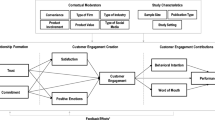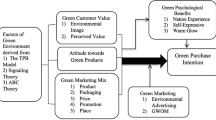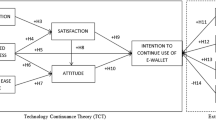Abstract
Although the pivotal role of satisfaction in explaining travel behavior proposed is well studied in the literature, there is still an underexplored link between satisfaction and travel habits. This study addresses the missing link between satisfaction and habits in travel mode use. Our theoretical elaboration suggests an indirect association between satisfaction and habits through the involvement of the interaction between satisfaction and frequency of mode use repetition. Two hypotheses are developed. The first hypothesis assumes that the interaction between satisfaction and mode use frequency is the factor that significantly positively affects travel mode use habits. The second hypothesis assumes that time is the factor that strengthens the relative role of the automatic motives over the reasoned motives in deciding travel mode use. A series of structural equation modelling analyses based on 887 individual data of a questionnaire survey, covering three travel modes (motorcycle, car and bus), showed support to the hypotheses. This allows us to suggest an indirect association between satisfaction and habits through the involvement of the interaction between satisfaction and frequency of choice repetition. Findings of this study are important to the field as they are touching one of the key issues in travel mode use studies.








Similar content being viewed by others
Data Availability
Data can be conditionally provided uppon requests.
References
Aarts, H., Paulussen, T., Schaalma, H.: Physical exercise habit: on the conceptualization and formation of habitual health behaviours. Health Educ. Res. 12(3), 363–374 (1997)
Abou-Zeid, M., Fujii, S.: Travel satisfaction effects of changes in public transport usage. Transportation 43(2), 301–314 (2016)
Abou-Zeid, M., Witter, R., Bierlaire, M., Kaufmann, V., Ben-Akiva, M.: Happiness and travel mode switching: Findings from a Swiss public transportation experiment. Transp. Policy 19(1), 93–104 (2012)
Ajzen, I., Fishbein, M.: Attitudes and the attitude-behavior relation: Reasoned and automatic processes. In: Stroebe, W., Hewstone, M. (eds.) European review of social psychology, pp. 1–33. Wiley, Chichester (2000)
Ajzen, I.: The theory of planned behavior. Organ. Behav. Hum. Decis. Process. 50(2), 179–211 (1991)
Ajzen, I.: Nature and operation of attitudes. Annu. Rev. Psychol. 52, 27–58 (2001)
Ajzen, I.: Residual effects of past on later behavior: Habituation and reasoned action perspectives. Pers. Soc. Psychol. Rev. 6, 107–122 (2002)
Bagozzi, R., Yi, Y.: Specification, evaluation, and interpretation of structural equation models. J. Acad. Mark. Sci. 40(1), 8–34 (2012)
Bamberg, S., Schmidt, P.: Incentives, morality, or habit? Predicting student’s car use for university routes with the models of Ajzen, Schwartz, and Triandis. Environ. Behav. 35, 264–285 (2003)
Barkowsky, T., Knauff, M., Ligozat, G., Montello, D.R.: Spatial Cognition V: Reasoning, Action. Springer-Verlag, Berlin, Heidelberg, Interaction (2007)
Barrett, L.F.: How emotions are made: The secret life of the brain. Houghton Mifflin Harcourt, New York (2017). (ISBN 978-1-5098-3750-2)
Beirão, G., Cabral, J.A.S.: Understanding attitudes towards public transport and private car: a qualitative study. Transp. Policy 14(6), 478–489 (2007)
Berry, L.L., Parasuraman, A.: Marketing services: competing through quality. Free Press, New York (2004)
Breckler, S.J.: Empirical validation of affect, behavior, and cognition as distinct components of attitude. J. Pers. Soc. Psychol. 47(6), 1191–1205 (1984)
Cao, X.: The association between light rail transit and satisfactions with travel and life: evidence from Twin Cities. Transportation 40, 921–933 (2013)
Cheung, F., Lucas, R.E.: Assessing the validity of single-item life satisfaction measures: results from three large samples. Qual. Life Res.: Int. J. Qual. Life Asp. Treat. Care Rehab. 23(10), 2809–2818 (2014)
Corvec, S.S., Zhao, J.: Transport and emotion: How neurosciences could open a new research field. Travel Behav. Soc. 20, 12–21 (2020)
de Oña, J., de Oña, R., Eboli, L., Mazzulla, G.: Perceived service quality in bus transit service: A structural equation approach. Transp. Policy 29, 219–226 (2013)
De Vos, J.: Do people travel with their preferred travel mode? Analysing the extent of travel mode dissonance and its effect on travel satisfaction. Transp. Res. Part A 117, 261–274 (2018)
De Vos, J.: Satisfaction-induced travel behavior. Transp. Res. Part A 63, 12–21 (2019)
De Vos, J., Mokhtarian, P.L., Schwanen, T., Van Acker, V., Witlox, F.: Travel mode choice and travel satisfaction: bridging the gap between decision utility and experienced utility. Transportation 43(5), 771–796 (2016)
DeVos, J., Witlox, F.: Travel satisfaction revisited. On the pivotal role of travelsatisfaction in conceptualising a travel behaviour process. Transp. Res. Part A: Policy Pract. 106, 364–373 (2017)
Paul, E.S., Sher, S., Tamietto, P., Winkielman, P., Mendl, M.T.: Towards a comparative science of emotion: affect and consciousness in humans and animals. Neurosci. Biobehav. Rev. 108, 749–770 (2020)
Eagly, A.H., Chaiken, S.: The psychology of attitudes. Harcourt Brace Jovanovich, Orlando (1993)
Ettema, D., Gärling, T., Eriksson, L., Friman, M., Olsson, L.E., Fujii, S.: Satisfaction with travel and subjective well-being: development and test of a measurement tool. Transp. Res. Part F 14(3), 167–175 (2011)
Feather, N.T. (ed.): Erlbaum, Hillsdale (1982)
Fishbein, M., Ajzen, I.: Belief, attitude, intention, and behavior: an introduction to theory and research. Addison-Wesley, Reading (1975)
Friedrichsmeier, T., Matthies, E., Klockner, C.A.: Explaining stability in travel mode choice: An empirical comparison of two concepts of habit. Transp. Res. Part F 16, 1–13 (2013)
Fujii, S., Gärling, T.: Application of attitude theory for improved predictive accuracy of stated preference methods in travel demand analysis. Transp. Res. Part A 37(4), 389–402 (2003)
Fujii, S., Garling, T.: Role and acquisition of car use habit. In: Garling, T., Steg, L. (eds.) Threats from car traffic to the quality of urban life. Elsevier, Amsterdam (2007)
Gardner, B.: Modelling motivation and habit in stable travel mode contexts. Transp. Res. Part F 12, 68–76 (2009)
Gardner, B.: A review and analysis of the use of “habit” in understanding, predicting and influencing health-related behaviour. Health Psychol. Rev. 9, 277–295 (2015)
Garling, T., Fujii, S., Boe, O.: Empirical tests of a model of determinants of script-based driving choice. Transp. Res. Part F 4, 89–102 (2001)
Gatersleben, B.: Affective and symbolic aspects of car use. In: Garling, T., Steg, L. (eds.) Threats from car traffic to the quality of urban life: problems, causes, and solutions, pp. 219–233. Elsevier, Amsterdam (2007)
Gluck, M.A., Mercado, E., Myers, C.E.: Learning and memory: from brain to behavior. Worth Publishers, New York (2007)
Gurumurthy, K.M., Kockelman, K.M.: Modeling Americans’ autonomous vehicle preferences: A focus on dynamic ride-sharing, privacy & long-distance mode choices. Technol. Forecast. Soc. Chang. 150, 119792 (2020)
Haddock, G., Zanna, M.P.: Assessing the impact of affective and cognitive information in predicting attitudes toward capital punishment. Law Hum. Behav. 22, 325–339 (1998)
Haggar, P., Whitmarsh, L., Skippon, S.M.: Impacts of personalized accessibility information on residential location choice and travel behavior. Transp. Res. Part F 64, 1–13 (2019)
Hair, J.F., Black, W.C., Babin, B.J., Anderson, R.E.: Multivariate data analysis, 7th edn. Pearson Education Limited (2014)
Han, H., Kim, Y., Kim, E.K.: Cognitive, affective, conative, and action loyalty: Testing the impact of inertia. Int. J. Hosp. Manag. 30, 1008–1019 (2011)
Hoang-Tung, N., Kojima, A., Kubota, H.: Transformation from intentions to habits in travel behavior: An awareness of a mediated form of intention. Transp. Res. Part F 49, 226–235 (2017)
Hoang-Tung, N., Kubota, H.: Application of attitude theory for identifying the effects of non-attendance attributes in stated choice surveys. Travel Behav. Soc. 12, 64–71 (2018)
Hoang-Tung, N., Linh, N.H., Cuong, H.V., Binh, P.L., Takeda, S., Kato, H.: Ride-hailing service adoption and local context in motorcycle-based societies: case study in Hanoi, Vietnam. Sustainability 14(2), 728 (2022)
Iacobucci, D., Schneider, M.J., Popovich, D.L., Bakamitsos, G.A.: Mean centering helps alleviate “micro” but not “macro” multicollinearity. Behav. Res. Methods 48, 1308–1317 (2016)
Isaac, R.K., Velden, V.: The German source market perceptions: how risky is Turkey to travel to? Int. J. Tour. Cities 4(4), 429–451 (2018)
Kahneman, D., Krueger, A.B.: Developments in the measurement of subjective well-being. J. Econ. Perspect. 20(1), 3–24 (2006)
Katz, D.: The functional approach to the study of attitudes. Public Opin. Q. 24(2), 163–204 (1960)
Kroesen, M., Chorus, C.: The role of general and specific attitudes in predicting travel behavior – A fatal dilemma? Travel Behav. Soc. 10, 33–41 (2018)
Lai, W.T., Chen, C.F.: Behavioral intentions of public transit passengers – the roles of service quality, perceived value, satisfaction and involvement. Trans. Policy. 18, 318–325 (2011)
Lally, P., Gardner, B.: Promoting habit formation. Health Psychol. Rev. 7(sup1), S137–S158 (2013)
Lazarus, R.S., Kanner, A.D., Folkman, S.: Emotions: A cognitive-phenomenological analysis. In: Plutchik, R., Kellerman, H. (eds.) Theories of emotion, pp. 189-217 424. Academic Press, Elsevier, New York (1980)
Lind, H.B., Nordfjærn, T., Jørgensen, S.H., Rundmo, T.: The value-belief-norm theory, personal norms and sustainable travel mode choice in urban areas. J. Environ. Psychol. 44, 119–125 (2015)
Mao, Z., Ettema, D., Dijst, M.: Commuting trip satisfaction in Beijing: exploring the influence of multimodal behavior and modal flexibility. Transp. Res. Part A 94, 592–603 (2016)
McClelland, G.H., Irwin, J.R., Disatnik, D., Sivan, L.: Multicollinearity is a redherring in the search for moderator variables: A guide to interpreting moderated multiple regression models and a critique of Iacobucci, Schneider, Popovich, and Bakamitsos (2016). Behav. Res. Methods 49(1), 394–402 (2017)
McConnell, A.R., Leibold, J.M., Sherman, S.J.: Within-target illusory correlations and the formation of context-dependent attitudes. J. Pers. Soc. Psychol. 73, 675–686 (1997)
Mokhtarian, P.L., Salomon, I., Singer, M.E.: What moves us? An interdisciplinary exploration of reasons for traveling. Transport Rev. 35(3), 250–274 (2015)
Neal, D.T., Wood, E., Quinn, J.M.: Habits: A repeat performance. Curr. Dir. Psychol. Sci. 15, 198–202 (2006)
Nilsen, P., Roback, K., Broström, A., Ellström, P.-E.: Creatures of habit: Accounting for the role of habit in implementation research on clinical behaviour change. Implement. Sci. 7, 53 (2012)
Oliver, R.L.: Satisfaction: A behavioral perspective on the consumer. MacGraw-Hill, New York (1997)
Oliver, R.L.: Whence consumer loyalty? J. Mark. 63(4), 33–45 (1999)
Petrescu, M.: Marketing research using single-item indicators in structural equation models. J. Mark. Anal. 1, 99–117 (2013)
Ramos, E.M.S., Bergstad, C.J., Nässén, J.: Understanding daily car use: Driving habits, motives, attitudes, and norms across trip purposes. Transport. Res. F: Traffic Psychol. Behav. 68, 306–315 (2020)
Simon, H.: Motivational and emotional controls of cognition. Psychol. Rev. 74(1), 29–39 (1967)
Smith, E.R., De Coster, J.: Dual process models in social and cognitive psychology: Conceptual integration and links to underlying memory systems. Pers. Soc. Psychol. Rev. 4, 108–131 (2000)
St-Louis, E., Manaugh, K., van Lierop, D., El-Geneidy, A.: The happy commuter: a comparison of commuter satisfaction across modes. Transp. Res. Part F 26, 160–170 (2014)
Susilo, Y.O., Cats, O.: Exploring key determinants of travel satisfaction for multi-modal trips by different traveler groups. Transp. Res. Part A 67, 366–380 (2014)
Verplanken, B., Aarts, H.: Habit, attitude, and planned behaviour: Is habit an empty construct or an interesting case of goal-directed automaticity? Eur. Rev. Soc. Psychol. 10, 101–134 (1999)
Verplanken, B., Orbell, S.: Reflections on past behavior: A self-report index of habit strength. J. Appl. Soc. Psychol. 33, 1313–1330 (2003)
Verplanken, B., Wood, W.: Interventions to break and create consumer habits. J. Public Policy Mark. 25, 90–103 (2006)
Verplanken, B., Aarts, H., van Knippenberg, A., van Knippenberg, C.: Attitude versus general habit: Antecedents of travel mode choice. J. Appl. Soc. Psychol. 24, 285–300 (1994)
Wood, W., Neal, D.: A new look at habits and the habit-goal interface. Psychol. Rev. 114, 843–863 (2007)
Wood, W., Neal, D.T.: The habitual consumer. J. Consum. Psychol. 19(4), 579–592 (2009)
Wood, W., Quinn, J.M., Kashy, D.A.: Habits in everyday life: Thought, emotion, and action. J. Pers. Soc. Psychol. 83, 1281–1297 (2002)
Wood, W., Tam, L., Guerrero, W.M.: Changing circumstances, disrupting habits. J. Pers. Soc. Psychol. 88, 918–933 (2005)
Wyczesany, M., Ligeza, T.S.: Towards a constructionist approach to emotions: verification of the three-dimensional model of affect with EEG-independent component analysis. Exp. Brain Res. 233, 723–733 (2015)
Ye, R., De Vos, J., Ma, L.: Analysing the association of dissonance between actual and ideal commute time and commute satisfaction. Transp. Res. Part A 132, 47–60 (2020)
Author information
Authors and Affiliations
Contributions
The author confirm contributions to the paper as follows: XXX takes care of all parts of this study including study conception and design; data collection; analysis and interpretation of results and draft manuscript preparation.
Corresponding author
Ethics declarations
Conflicts of Interest
On behalf of all authors, the corresponding author states that there is no conflict of interest.
Additional information
Publisher's Note
Springer Nature remains neutral with regard to jurisdictional claims in published maps and institutional affiliations.
Rights and permissions
Springer Nature or its licensor (e.g. a society or other partner) holds exclusive rights to this article under a publishing agreement with the author(s) or other rightsholder(s); author self-archiving of the accepted manuscript version of this article is solely governed by the terms of such publishing agreement and applicable law.
About this article
Cite this article
Hoang-Tung, N. Recognizing the Involvement of Satisfaction in Nurturing Habits of Travel Mode Use. Int. J. ITS Res. 21, 293–309 (2023). https://doi.org/10.1007/s13177-023-00353-5
Received:
Revised:
Accepted:
Published:
Issue Date:
DOI: https://doi.org/10.1007/s13177-023-00353-5




